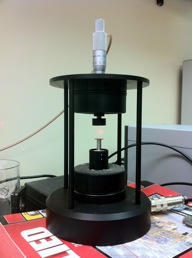2010 Annual Science Report
 University of Hawaii, Manoa
Reporting | SEP 2009 – AUG 2010
University of Hawaii, Manoa
Reporting | SEP 2009 – AUG 2010
Nanoparticle Levitator
Project Summary
Reactions on the surfaces of micron and nano-sized particles are important in many areas of science including astrochemistry. Thus far, most of our understanding of such surface chemistry has been obtained from standard surface-science techniques. We are assembling and testing an
acoustic levitation device to levitate and trap microparticles. The work is relevant to the formation of astrobiologically important molecules on silicate particles in the interstellar medium.
Project Progress
Nanoparticle Levitator Set up
Reactions on the surfaces of micron and nano-sized particles are important in many areas of science including astrochemistry. Thus far, most of our understanding of such surface chemistry has been obtained from standard surface-science techniques. However, studying physical and chemical processes on the large bulk samples typically used in surface science may differ from that on the surface of micron or nano-sized particles. We are therefore assembling and testing an acoustic levitation device to levitate and trap microparticles. The work is relevant to the formation of astrobiologically important molecules on silicate particles in the interstellar medium.
As shown in the Figure, we have successfully levitated particles with dimensions in the range from tens of microns to a few mm. We are presently incorporating the ultrasonic trap into a vacuum chamber to simulate the conditions in the interstellar medium. Chemical reactions are induced on the surfaces of the microparticles by photon and charged particle irradiation. The instrument will be interfaced to existing non-invasive infrared, Raman, and UV-VIS spectroscopic probes to study the molecules formed on the surfaces of the particles. This is the first time that infrared, Raman, and UVVIS spectroscopy has been combined into a single levitation experiment.

A particle suspended in the nodal region of the ultrasonic trap.
-
PROJECT INVESTIGATORS:
-
PROJECT MEMBERS:
Chris Bennett
Co-Investigator
Ralf Kaiser
Co-Investigator
-
RELATED OBJECTIVES:
Objective 3.1
Sources of prebiotic materials and catalysts